ZM 309 gets presidential nod in Malawi
On 3 September 2009, a new drought tolerant maize variety received presidential approval in Malawi. The variety, ZM 309, known by locals as ‘msungabanja’ (that which takes care of the family), will be included in the national farm input subsidy program and is to be planted by farmers in Malawi’s most drought prone areas this October.
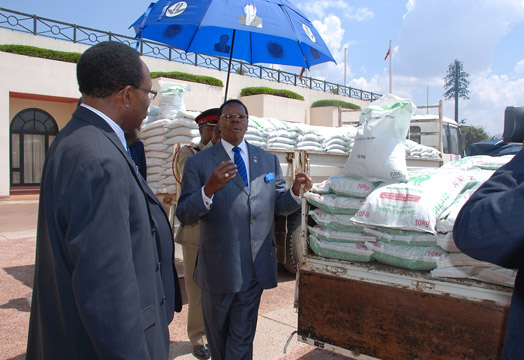 Malawi’s President Bingu wa Mutharika hosted CIMMYT’s Wilfred Mwangi, project leader of Drought Tolerant Maize for Africa (DTMA), and Peter Setimela, maize breeder, at the State House in Lilongwe. The two briefed him on CIMMYT’s maize research activities and collaboration in Malawi, which date back to 1974. “The new maize variety, ZM 309, released under the auspices of the DTMA Project, will give Malawi farmers an advantage because it is high yielding and drought tolerant,” said President Bingu wa Mutharika on receiving a 10-ton consignment of ZM 309 seed presented by Mwangi and Setimela on behalf of CIMMYT. “We welcome this research because it will help Malawi cope with climate change and improve food security.”
Malawi’s President Bingu wa Mutharika hosted CIMMYT’s Wilfred Mwangi, project leader of Drought Tolerant Maize for Africa (DTMA), and Peter Setimela, maize breeder, at the State House in Lilongwe. The two briefed him on CIMMYT’s maize research activities and collaboration in Malawi, which date back to 1974. “The new maize variety, ZM 309, released under the auspices of the DTMA Project, will give Malawi farmers an advantage because it is high yielding and drought tolerant,” said President Bingu wa Mutharika on receiving a 10-ton consignment of ZM 309 seed presented by Mwangi and Setimela on behalf of CIMMYT. “We welcome this research because it will help Malawi cope with climate change and improve food security.”
The variety will be grown in Balaka, Chikwawa, Nsanje, and Karonga, and the consignment is adequate to plant a minimum of 400 hectares. “We at CIMMYT commend Malawi’s leadership for implementing innovative agricultural policies that have made the country a great example for improving national food security in Africa,” said Mwangi. “We will work with the government of Malawi to help farmers cope with climate change by using drought tolerant maize technology.”
ZM 309 is a drought tolerant, open-pollinated maize variety, meaning farmers have the option to save seed for subsequent seasons with minimum yield loss. ZM 309 was developed through collaborative research efforts with CIMMYT, Malawi’s Ministry of Agriculture and Food Security, and Chitedze Research Station. CIMMYT also included an information leaflet on ZM 309 in each 10-kilo bag of seed as part of efforts to provide information about new varieties to farmers. CIMMYT is most grateful to Andrew Daudi, Malawi’s principal secretary in the Ministry of Agriculture and Food Security, and to Jeff Luhanga, controller of Agricultural Extension and Technical Services from the same department, for their support and facilitation assistance. Collaboration with SeedCo Malawi in producing the required seed is also acknowledged, and particular gratitude is due to SeedCo employees Dellings Phiri, general manager, and John Lungu, operations executive. Also participating in the event was Anne Wangalachi, CIMMYT science writer/editor.
 Girma Tesfahun, post doctoral fellow based at CIMMYT’s office in Addis Ababa, was elected president of the Agricultural Economics Society of Ethiopia (AESE) for the next two years. The AESE’s general assembly elected Tesfahun at their 12th annual conference from 14-15 August 2009 in Addis Ababa. The executive committee has five members and includes senior economists from universities, national agricultural research programs, the private sector, and staff from the
Girma Tesfahun, post doctoral fellow based at CIMMYT’s office in Addis Ababa, was elected president of the Agricultural Economics Society of Ethiopia (AESE) for the next two years. The AESE’s general assembly elected Tesfahun at their 12th annual conference from 14-15 August 2009 in Addis Ababa. The executive committee has five members and includes senior economists from universities, national agricultural research programs, the private sector, and staff from the 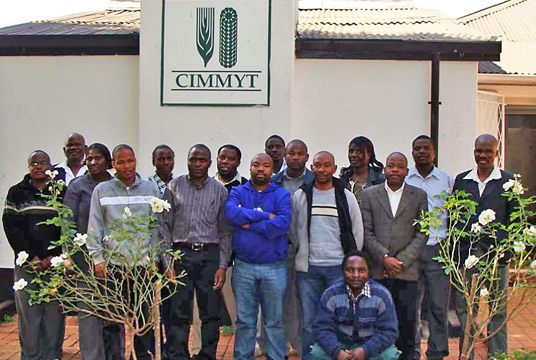 Is it possible for a software to act as a one-stop shop and help manage maize breeding? Indeed it is, and CIMMYT’s Fieldbook provides both.
Is it possible for a software to act as a one-stop shop and help manage maize breeding? Indeed it is, and CIMMYT’s Fieldbook provides both.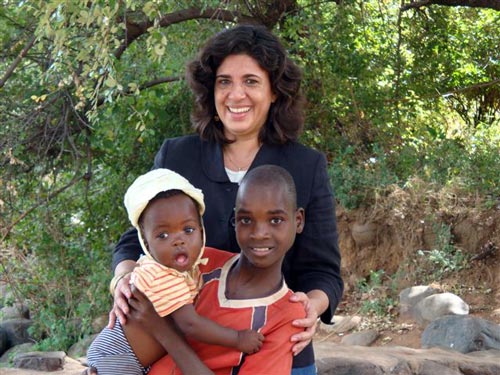 It was a short visit but by no means an unproductive one: from 18–22 May 2009, a Corporate Services team from CIMMYT-El Batán visited the center’s Nairobi and Harare regional offices. The team consisted of Luis De Anda, finance manager; Marisa de la O, human resources (HR) manager; Carlos López, information and communication technology (ICT) manager; and Scott Ferguson, deputy director general for Corporate Services.
It was a short visit but by no means an unproductive one: from 18–22 May 2009, a Corporate Services team from CIMMYT-El Batán visited the center’s Nairobi and Harare regional offices. The team consisted of Luis De Anda, finance manager; Marisa de la O, human resources (HR) manager; Carlos López, information and communication technology (ICT) manager; and Scott Ferguson, deputy director general for Corporate Services.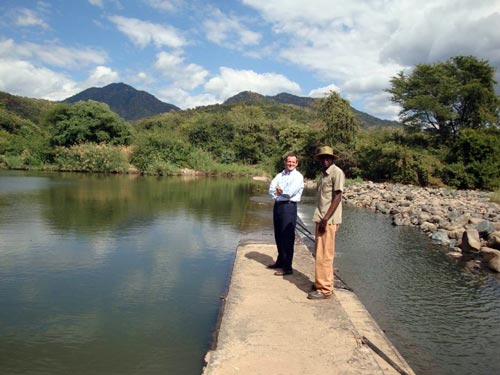 In Zimbabwe, the team visited the new dam that supplies water to CIMMYT’s Muzarabani station –the old dam was destroyed by flooding. Joseph Makamba, field supervisor, also showed them the station’s winter nursery, which had over seven hectares dedicated to nurseries and seed multiplication. Unfortunately, frequent power outages make nursery irrigation sporadic; during the visit Makamba had to travel 60 km to bring national power supply technicians to repair overhead power lines and restore electricity to the pumping station.
In Zimbabwe, the team visited the new dam that supplies water to CIMMYT’s Muzarabani station –the old dam was destroyed by flooding. Joseph Makamba, field supervisor, also showed them the station’s winter nursery, which had over seven hectares dedicated to nurseries and seed multiplication. Unfortunately, frequent power outages make nursery irrigation sporadic; during the visit Makamba had to travel 60 km to bring national power supply technicians to repair overhead power lines and restore electricity to the pumping station.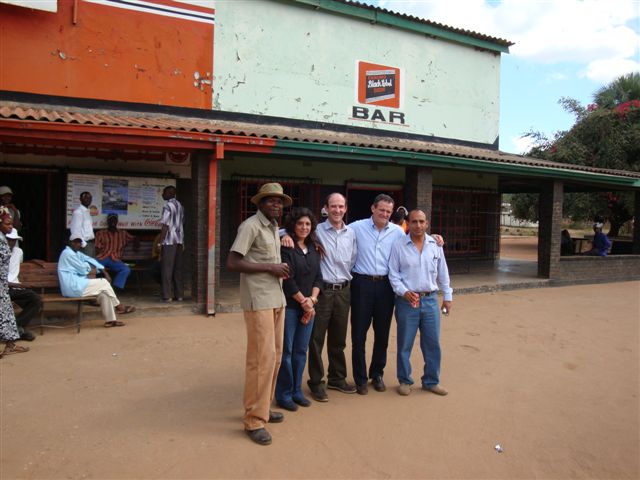 De la O was especially touched by the temporary workers she met in Harare, many of whom are mothers that leave their families for months at a time to make ends meet. “I would like for all employees to have the same level of benefits, regardless of where they’re from or if they are temporary or permanent,” she said. “We want to offer a better level of support and work in a global sense.” De la O addressed some issues on the spot, and will followup with others after an analysis of all the regional offices and making a strategic HR plan.
De la O was especially touched by the temporary workers she met in Harare, many of whom are mothers that leave their families for months at a time to make ends meet. “I would like for all employees to have the same level of benefits, regardless of where they’re from or if they are temporary or permanent,” she said. “We want to offer a better level of support and work in a global sense.” De la O addressed some issues on the spot, and will followup with others after an analysis of all the regional offices and making a strategic HR plan.